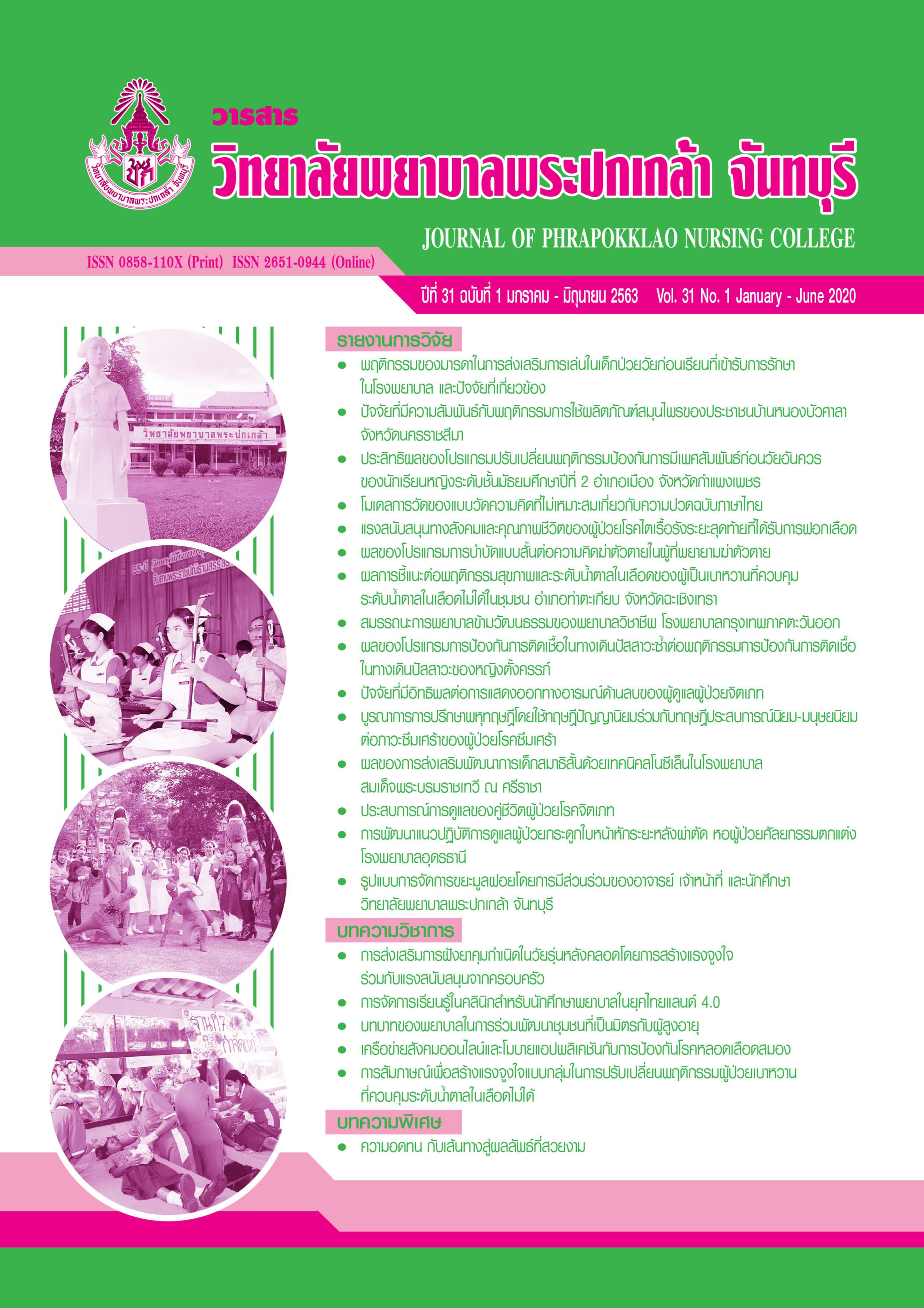Group Motivational Interviewing for Behavior Modification among Uncontrolled Diabetic Patients
Keywords:
Group motivational interviewing, Behavior modification, Uncontrolled diabetic patientAbstract
The motivation for behavior modification is essential for uncontrolled diabetic patients. The main purpose is to encourage patients to control their conditions, reduce disease complications and mortality. Motivational interviewing (MI) is one of the motivational techniques widely used. Especially, a group MI that can be applied to a considerable number of patients is suitable for uncontrolled diabetic patients. To apply MI properly, health care providers must comprehend MI principles consisting of expressing empathy, developing discrepancy, avoiding argumentation, rolling with resistance, and supporting self-efficacy. MI consists of two major steps: 1) assessing patient’s stage of change and 2) providing activities to each group of patients with the same stage of change. It is expected that group MI would be an alternative to improve effective patient care.
References
จันจิรา หินขาว, ขนิตฐา หาญประสิทธิ์คำ, และสุนทรี เจียรวิทยกิจ. (2562). ผลของโปรแกรมการจัดการตนเองร่วมกับการสัมภาษณ์เพื่อสร้างแรงจูงใจ เพื่อชะลอไตเสื่อมจากเบาหวานต่อพฤติกรรมการจัดการตนเองและผลลัพธ์ทางคลินิกในผู้ป่วยเบาหวานชนิดที่ 2 ที่มีความเสื่อมของไตระยะที่ 3. วารสารวิทยาลัยพยาบาลพระปกเกล้า จันทบุรี, 30(2), 185-202.
สุดถนอม ปิตตาทะโน. (2556). ผลของการให้คำปรึกษาโดยใช้การสัมภาษณ์เพื่อเสริมสร้างแรงจูงใจ ต่อการควบคุมดัชนีมวลกายของผู้ป่วยเบาหวานชนิดที่ 2. สืบค้นจาก http://www.amsarthailand.utcc.ac.th/attachments/article/34/Sudtanorm.pdf
Chen, S. M., Creedy, D., Lin, H. S., & Wollin, J. (2012). Effects of motivational interviewing intervention on self-management, psychological and glycemic outcomes in type 2 diabetes: A randomized controlled trial. International Journal of Nursing Studies, 49(6), 637-644.
Ekong, G., & Kavookjian, J. (2016). Motivational interviewing and outcomes in adults with type 2 diabetes: A systematic review. Patient Education and Counseling, 99(6), 944-952.
Miller, W. R., & Rollnick, S. (1991). Motivational interviewing: Preparing people to change addictive behavior. New York: Guilford Press.
Miller, W. R., & Rollnick, S. (2002). Motivational interviewing: Preparing people for change (2nd ed.). New York: Guilford Press.
Song, D., Xu, T. Z., & Sun, Q. H. (2014). Effect of motivational interviewing on self-management in patients with type 2 diabetes mellitus: A meta-analysis. International Journal of Nursing Sciences, 1(3), 291-297.
Wattanakorn, K., Deenan, A., Puapan, S., & Schneider, J. K. (2013). Effects of an eating behaviour modification program on Thai people with diabetes and obesity: A randomised clinical trial. Pacific Rim International Journal of Nursing, 17(4), 356-370.
Downloads
Published
How to Cite
Issue
Section
License
Copyright (c) 2020 JOURNAL OF PHRAPOKKLAO NURSING COLLEGE

This work is licensed under a Creative Commons Attribution-NonCommercial-NoDerivatives 4.0 International License.
เนื้อความ ข้อมูล และรายการอ้างอิงที่ผู้เขียนใช้ในการเขียนบทความเพื่อลงตีพิมพ์ในวารสารวิทยาลัยพยาบาลพระปกเกล้า จันทบุรี ถือเป็นความคิดเห็นและความรับผิดชอบของผู้เขียน คณะผู้จัดทำวารสารไม่จำเป็นต้องเห็นพ้องด้วยหรือร่วมรับผิดชอบ
บทความที่ได้รับการลงตีพิมพ์ในวารสารวิทยาลัยพยาบาลพระปกเกล้า จันทบุรี ถือเป็นลิขสิทธิ์ของวารสารวิทยาลัยพยาบาลพระปกเกล้า จันทบุรี หากหน่วยงานหรือบุคคลใดต้องการนำส่วนหนึ่งหรือทั้งหมดของบทความไปเผยแพร่ต่อเพื่อวัตถุประสงค์ใด ๆ จะต้องได้รับอนุญาตจากบรรณาธิการวารสารก่อน



